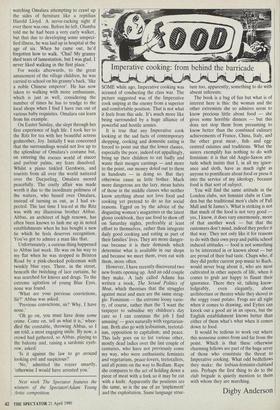Imperative cooking: from behind the barricade
IL • 0Ork.' JoittfiL.' .JAPAL..."Llook( SOME while ago, Imperative cooking was accused of conducting the class war. The picture suggested was of the Imperative cook sniping at the enemy from a superior and comfortable position. That is not what it feels from this side. It's much more like being surrounded by a huge alliance of powerful and hostile armies.
It is true that any Imperative cook looking at the sad facts of contemporary shopping, cooking and domestic eating is forced to point out that the lower classes, especially the poor, indeed eat appallingly, bring up their children to eat badly and waste their meagre earnings — and more to the point, our money doled out to them in handouts — in doing so. But they otherwise cause us little bother. Much more dangerous are the lazy, mean habits of those in the middle classes who neither know anything about nor love food and cooking yet pretend to do so for social reasons. Egged on by the advice of the disgusting women's magazines or the latest glossy cookbook, they use food to show off on Saturday nights, preferably at least effort to themselves, rather than integrate daily good cooking and eating as part of their families' lives. They are more danger- ous because it is their demands which determine what is available in our shops and because we meet them, even eat with them, more often.
However, I have recently discovered two new fronts opening up. And an odd couple they make. A lady called Adams has written a book, The Sexual Politics of Meat, which theorises that the struggles against meat and men are the same strug- gle. Feminism — the extreme loony varie- ty, of course, rather than the 'I want the taxpayer to subsidise my children's day care so I can continue the job I find amusing' — goes naturally with vegetarian- ism. Both also go with lesbianism, teetotal- ism, opposition to capitalism, and peace. This lady goes on to list various other, mostly dead ladies over the last couple of centuries, who have not previously come my way, who were enthusiastic feminists and vegetarians, peace-lovers, teetotallers, and all points on the way to Bedlam. Rape she compares to the act of holding down a piece of meat with a fork so it may be cut with a knife. Apparently the positions are the same, so is the use of an 'implement' and the exploitation. Same language struc- ture too, apparently; something to do with absent referents.
The book is a bag of fun but what is of interest here is this: the woman and the other extremists she so admires seem to know precious little about food — she gives some horrible dinners — but this does not stop them from presuming to know better than the combined culinary achievements of France, China, Italy, and the other great meat-, fish- and egg- centred cuisines and traditions. What the sisters exemplify has nothing to do with feminism: it is that old Anglo-Saxon atti- tude which insists that I, in all my ignor- ance and sloth, have as much right as anyone to pontificate about food or press it into the service of my ideology, because food is that sort of subject.
You will find the same attitude in the London clubs, not feminist clubs in Cam- den but the traditional men's clubs of Pall Mall and St James's. What is striking is not that much of the food is not very good yes, I know, it does vary enormously, more of that another week — but that the customers don't mind, indeed they prefer it that way. They not only like it for reasons to do with their own prep and public school induced attitudes — food is not something to be interested in or known about — but are proud of their bad taste. Chaps who, if they did prefer current pop music to Bach, would never brag about it, who are most cultivated in other aspects of life, when it comes to grub are happy to flaunt their ignorance. There they sit, talking know- ledgeably, even elegantly, about architecture or theatre while they shovel in the soggy roast potato. Frogs are all right when it comes to drawing, and Eyties can knock out a good air in an opera, but the English establishment knows better than either of them what's what when it comes down to food.
It would be tedious to work out where this nonsense comes from and far from the point. Which is that these otherwise charming fellows are part of the huge array of those who constitute the threat to Imperative cooking. What odd bedfellows they make: the lesbian-feminist-clubland axis. Perhaps the first thing to do to the club brigade is quietly mention to them with whom they are marching.
Digby Anderson


















































 Previous page
Previous page